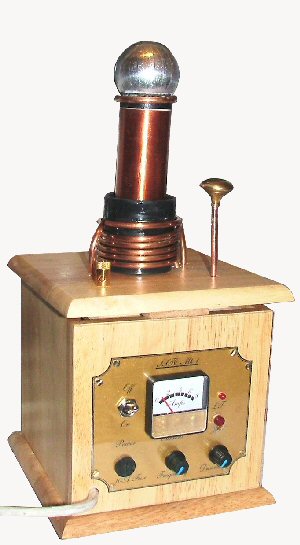
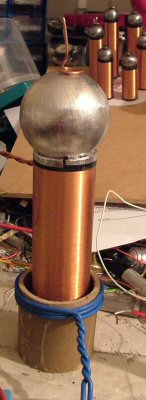 |
Experiments with an
SSTC
I decided to have a play with an SSTC, Having not
prepaired anything or ordered anything, it had to be from parts I had
lying around.
So, Taking a
pre wound secondary (1.3" diameter 800ish turns), a spare 2" topload ( wodden ball covered
in alu foil) an old half bridge that I never used in anything (2x irp460 and
GDT) ,my last IXY mosfet driver ic , a Transformer from
an old VCR (with all of its outputs seriesed to give me 140V
at about 300mA smoothed with a 400uf 400V cap.), primary of two turns of
4mm^2 around a 2" cardboard tube and I made a self resonant digital driver
using the circuit from millie tess (bread boarded).
Powered it up and "pif!" , sparks.. total build time
2 Hours...
Mosfets get a little hot, I must add a heat
sink.. |
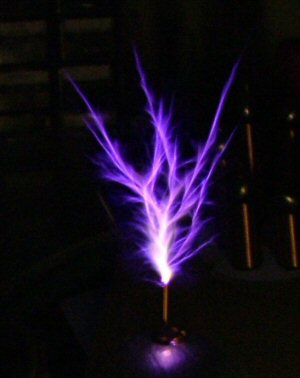 |
The first light was not too impressive. I had the interrupter at about 1khz and 50% mark space.
After noticing that there was a much bigger spark on turn on, I decided that the PSU was not supplying enough current.
So I changed the interrupter to about 8Hz at 1:10 mark space, and got the result shown. 2" sparks.
|
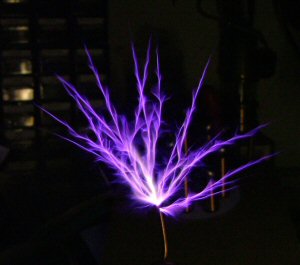 |
I played around with the coupling, and moved the primary coil to the top of the cardboard roll. givein an increase to the spark length (3"), and making them much more VTTC like..
|
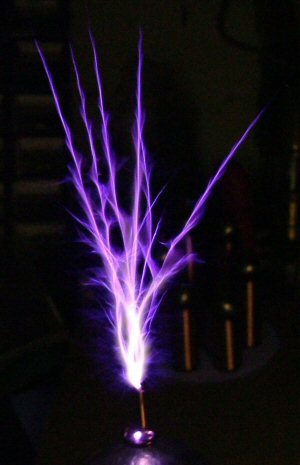 |
I had a
thought, and shortened the breakout point to about 1/2", this really give me VTTC like sparks.. now 3.5" long.
Next A
full bridge and/or 240V... Need a heat
sink... |
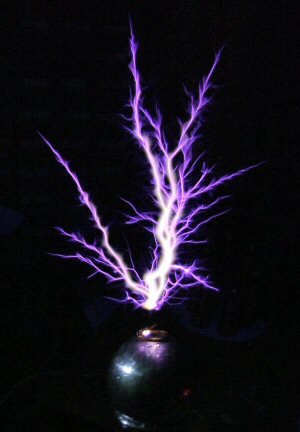 |
My order came for the IXY Drivers, so I now have a full bridge driving the GDT, giving me 10-12V of drive to the mosfets.
240V
in, Worked for a while and then took out both mosfets.. Probably due
to:-
1. I only had a two turn primary ( well youve got to push it a little..) so back to a 3T primary.
2. When the
oscilator was starting up it started at about 5Mhz and only gave 5V drive
via the GDT at this frequency, I changed the cap on the start up Osc, and It's run ok since.
6" Sparks !! (the coil is only 5" tall). I need a
strike rail before I get any bigger ones!!!
I've had to reduce the
coupling, as I was getting strikes to the primary, and this has made the
sparkes more bushy, maybe its this that gives VTTCs their sword like
outputs..
Next A full bridge or a resonant primary,
Oh yes... and
a heat sink...
|
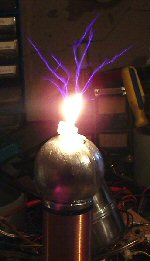 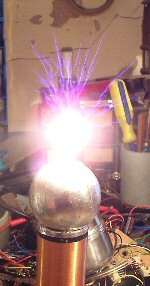 |
A quick play
replacing the breakout with a candle.
A cool bright white plasma, with a few streamers..
|
 |
Boxing an
SSTC
So After the success of playing
with the SSTC, I decided to make a nice job of boxing it..
Using 5mm copper tube I wound a primary(5 T), and
a Strike rail. Each turn is insulated from the next by a layer
of varnish.
The gap around the rim is intentional to let a flow of
air through the box. If I find a suitable set of brass fretwork or similar, I will
cover this gap.
The
single knob on a stick, is the feedback for the self resonant
driver.
I have
changed the circuit for the interrupter. I now use an LM339 PWM circuit to
give me a variable on time and frequency,
the
circuit diagram is here
I'm
not happy about the aluminium foil topload, and the pair of plastic
control knobs for the frequency and duration controls, but these will have
to stay until I find better looking replacements.
|
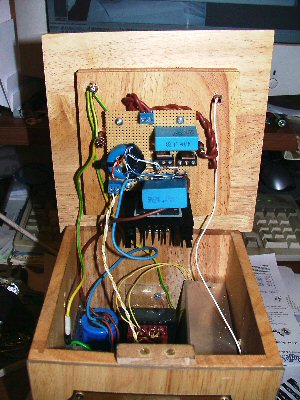 |
The Electronics is rather a tight fit into the box, All of the half bridge
is fixed into the lid, (note heatsink) with the GDT. The HV stuff is on the LHS of the box and the driver is on the RHS.
Running
the coil, does not quite give the same size of sparks that it used
to in the bread-boarded version. This is probably due to the extra turn on the
primsry (for reliability) and the looser coupling due to the primary beign
spread over 40mm rather than 10mm. |
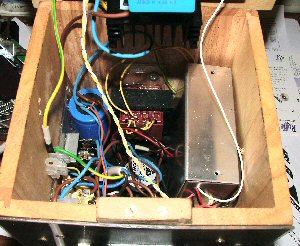 |
A better view inside the base. Somewhere at the bottom is the fan..
I had
HUGE problems with the driver, this close to the primary coil the analogue
PWM circuit for the modulation was suffering from EMP, every time the
coil struck the pulse would turn off the PWM and the on-time would end short,
then on the next pulse it would let out one long burst and blow all
the sillicon.
The driver is now contained in an aluminium box, to
protect against RF and the circuit has decoupling caps EVERYWHERE. The
problem has not gone away completly, but the pulse width control is at
least usable now. |
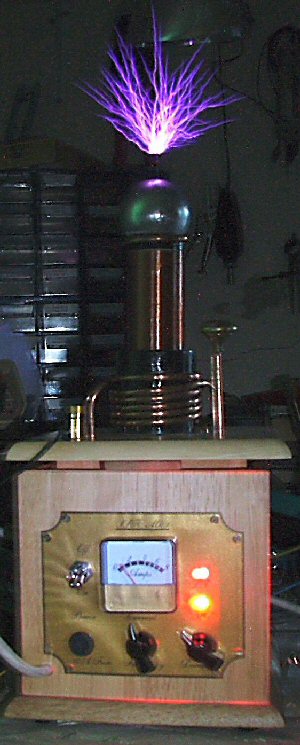 |
Running...
|
File:http://www.extremeelectronics.co.uk/old/coils/sstc/sstc-combined.php
Tesla Coils and High Voltage












